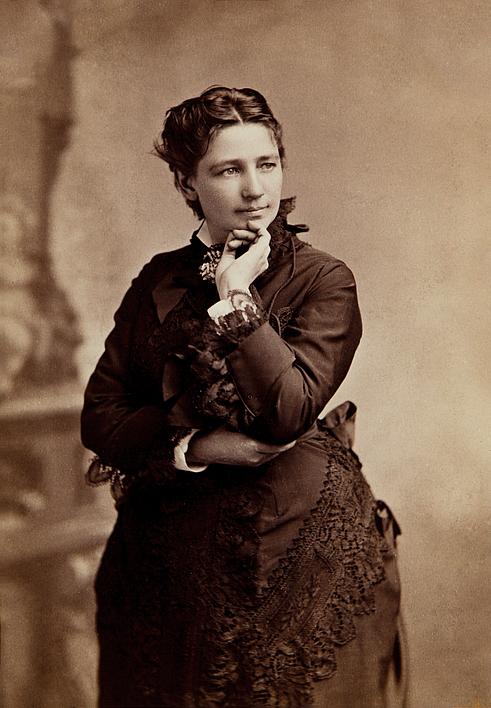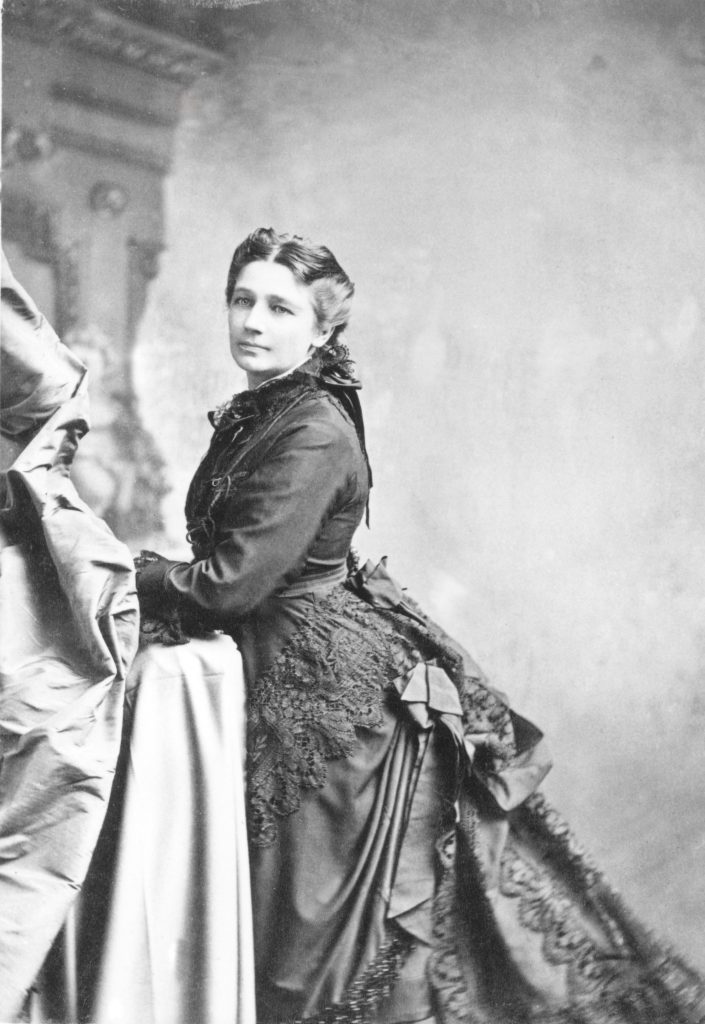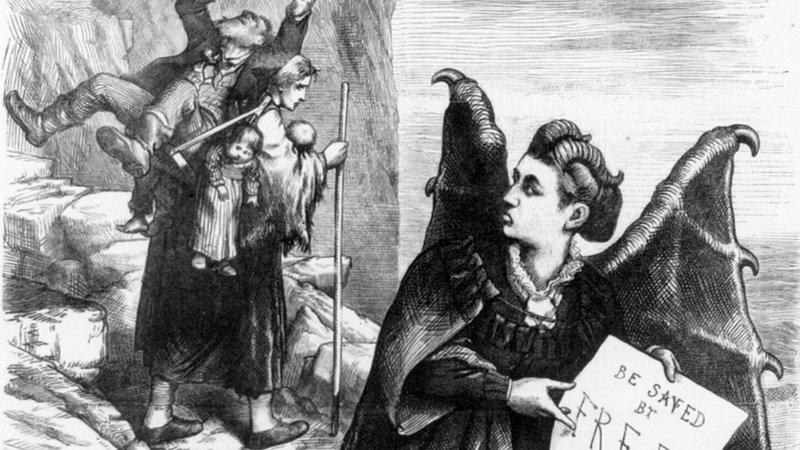Victoria Claflin Woodhull was the first women to ever run for president in the United States and the leader of the women’s suffrage movement. She ran in 1872 for the Equal Rights Party, though many historians have questioned whether or not her running for president was actually legal because she was younger than thirty-five. Woodhull was an avid supporter of free love as well and believed women should have the right to divorce and marry without the government interfering at all. Along with her sister, Tennessee Claflin, she was the first woman to ever work as a Wall Street broker. In 1870, they also began publishing Woodhull & Claflin’s Weekly, the first newspaper to ever be founded by women.
On September 23, 1838, Victoria California Claflin was born in Homer, Ohio to Roxanna “Roxy” Hummel Claflin and Reuben “Old Buck” Bickman Claflin. She was the seventh of ten children. Her mother was illiterate and a follower of the spiritualist movement while her father was a con man and a snake oil salesman. Seven year old Victoria was once accused of burning down a cupola. From a young age, her father sexually abused, beat, and starved her. Like her mother, Victoria also believed in the spiritualist movement.
Victoria attended elementary school starting at eight years old, but was on and off for three years. Her teaches believed her to be very intelligent, though she was forced to leave because her father burned their rotting gristmill. She also became very close with sister Tennessee Celeste as the years went on. Tennessee, or “Tennie”, was nearly seven years younger than Victoria, but they were very close and continued to work and collaborate together throughout their lives.
At fourteen, Victoria met Canning Woodhull, a twenty-eight year old doctor. They met when her family had him consult her to make sure she did not have a chronic illness. At the time, she had also been practicing medicine because Ohio did not require a formal medical education to do so. On November 20, 1853, Victoria and Canning married, she was fifteen. Not long after though, Victoria Woodhull found out her husband was both an alcoholic and womanizer. To support the family, she often had to work in or out of town. Together, they had Byron and Zulu (Zula) Maude Woodhull. Their son Byron is said to have been born with a mental disability, though there is only one account that supports this. There was another account that said Byron had fallen out of a window, causing him to become disabled. Shortly after Zulu was born, Victoria immediately divorced her husband, though keeping the surname Woodhull.

After the Civil War, Woodhull married in 1866 to Colonel James Harvey Blood, another spiritualist. In October of 1876, Woodhull divorced Blood. She married once more to John Biddulph Martin on October 31, 1883. Martin was a wealthy English banker. At first, the Martin family disapproved of their marriage, but learned to accept it. In 1901, Martin died. After their marriage, she was known as Victoria Woodhull Martin.
Following the divorce of her first husband, Woodhull became very supportive of the free love movement. It’s said that she began supporting it when she learned of Canning’s infidelity. Divorce at the time was nearly impossible and considered to be very socially unacceptable, no matter how bad it was. However, Woodhull believed that women should always have the right to divorce and escape a bad or loveless marriage. On November 20, 1871 she made a well known speech called the “Steinway speech” in New York at Steinway Hall that discussed this matter, She stated that she had the right to love whomever she wanted to for as long as she wanted and that no person or the law should ever interfere with her right to love. The following year, she criticized a well-known clergyman in public named Henry Ward Beecher for committing adultery. Woodhull was an avid criticizer of men unfaithful to their wives and having mistresses. Afterwards, she spent some time in jail for obscenity charges because she had sent accounts of the affair using federal mail. At the same time, she was running for President and this may have affected her campaign.
Previously, Woodhull had traveled by railroad to New York City by in 1868 with sister Tennessee “Tennie”. There they met Cornelius Vanderbilt, railroad proprietor and one of the wealthiest American citizens ever (outranked only by John D. Rockefeller). Her and Tennie lived on Great Jones Street together and was able to receive a $20,000 income from Vanderbilt and liaisons with him. Vanderbilt even asked Tennie to marry him at one point. His family was very much against it, and the proposal never went anywhere. The two were suspected of being lovers though. Though Woodhull spoke out against prostitution, she once expressed in Woodhull and Claflin’s Weekly that she supported legalization of sex work. Colonel Blood, her second husband who she had married a few years before, had told the story that once Victoria had to rescue Tennie who was being held against her will in a brothel. There is no proof of this story though.
Tennie and Woodhull became the first women in America to hold the profession of a stockbroker. They even opened opened their own brokerage firm called Woodhull, Claflin & Company in 1870 on Wall Street. Vanderbilt assisted them with their brokerage firm and was advised by Woodhull on the New York Stock Exchange, which gained a fortune from. Woodhull and Tennie were called things such as the “Queens of Finance” from New York Herald and other newspapers in the city.
Using the money from the brokerage firm, Woodhull and Tennie were able to start their own newspaper Woodhull & Claflin’s Weekly. in May of 1870. The newspaper’s main purpose was promoting Woodhull’s presidential campaign. For six years they continued to publish their newspaper together. It gained a reputation for its controversial content discussing topics such as free love, women’s rights, short skirts, and many other things. The two main authors were James Blood, Woodhull’s second husband, along with Stephen Pearl Andrews. A national scandal was set off in 1872 when the Weekly published a piece on the scandalous affair of Henry Ward Beecher and Elizabeth Tilton. Theodore Tilton had earlier told Elizabeth Cady Stanton about his wife’s affair. Stanton then told Woodhull about it. Woodhull was so disgusted and provoked by his adulterous affair, that she was determined to expose him. Beecher was taken to court in 1875, and the trial left everyone on their toes wanting to know the results.

Because the 14th and 15th amendments said all citizens could vote, Woodhull believed that women were already legally allowed to vote, but none of them did. Many members of the house Judiciary Committee were impressed by this, but others were not. She had planned to speak before the committee. When other leaders of the woman’s suffrage movement heard of Woodhull’s speech, they decided it logical to postpone the National Woman Suffrage Association’s third annual convention in 1871 so they could be present for the committee hearing. Woodhull was viewed as the new champion of the woman’s suffrage cause by prominent suffragists Susan B. Anthony, Elizabeth Cady Stanton, and Isabella Beecher Hooker after the speech. She became the first woman to petition before Congress and her popularity only grew. Throughout her life, Woodhull was seen as one of the most prominent suffragist leaders alongside Susan B. Anthony, Elizabeth Cady Stanton, and others. Eventually though, Woodhull and the other suffragist leaders fell out because they did not see eye to eye with her strong political opinions.
When Victoria Woodhull wrote a letter to the New York Harald’s editor on April 2, 1870, she officially announced she would be running for president. She spoke out fervently in 1871 about the fact that only men held political and governmental positions, and that women should too. Her idea was that under her presidency, a new constitution and government would be made. At the time, the Equal Rights Party was still very new and decided to elect Woodhull as their candidate on May 10, 1872, just over two years after she formally announced she was running. On June 6, 1872, they ratified her nomination and Frederick Douglass was nominated as her running mate. Douglass, however, did nothing to even acknowledge this nomination and neither attended the convention nor made any effort to campaign.
Historians agree that Woodhull was the first woman to ever run for United States President, though there is debate as to whether or not her running was actually legal. This is not debated because of her being a woman, but because she was not yet thirty-five years of age. If Wodhull had been elected, her inauguration would have been in March 1783 and her thirty-fifth birthday was that September.

The Woodhull & Claflin’s Weekly issue on November 2, 1872 was entirely dedicated to her support of free love and the scandalous affair of Elizabeth Tilton and Henry Ward Beecher, as mentioned above. In this issue, she spoke of how she saw this affair as the sexual-double standard between genders. Woodhull was arrested along with sister Tennie and husband Colonel James Blood the same day the issue was published for their newspaper being too obscene. This was only a few days away from the election, too. For a month, Woodhull and Tennie were held together in Ludlow Street Jail. Commonly, this jail was used for civil offenses but also held more notorious criminals. Six months later, the three of them were acquitted. Because she was in jail though, Woodhull was unable to vote in the election. In the end, she received no Electoral votes and the number of popular votes she gained is unknown. Votes casted towards Woodhull were not counted, so the numbers are unknown. Ulysses S. Grant won the election and served for his second term.
During the 1884 and 1892 elections, Woodhull tried to gain presidential nominations, but was unsuccessful. It was once quoted though that Woodhull said something along the lines of her being destined to one day become the United States President.
In 1877, Woodhull and Tennie moved to England where Woodhull met John Biddulph Martin. After her marriage to Martin, Woodhull took on the name Victoria Woodhull Martin. With help from daughter Zula, she published a magazine called The Humanitarian for nine years, from 1892 to 1901. She also published The Temple of God in 1890. The same year she stopped publishing her magazine, John Martin died and she retired to Bredon’s Norton in Worcestershire, England.
Victoria Woodhull Martin died in her sleep at Norton Park on June 10, 1927. At the time, she was eighty-eight year sold. Today, Victoria Woodhull is not often recognized in history, or is barely mentioned. Many people do not realize that the first woman to run for president was Victoria Woodhull in 1872. Woodhull was a person who was never afraid to speak out and let others know of her beliefs and opinions, no matter how controversial.